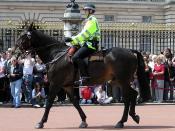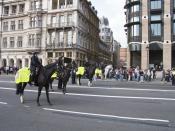An equal opportunity is and should always be a non-racist and non-sexist philosophy, but also a non-sexual orientation notion as well. It would appear that despite British Society acknowledging these problems, British policing is, and will remain, a long way behind the search for true equality, both within law enforcement and within the broader social life. Although women, minority ethnic group members, and those of a different sexual orientation are presumed to be equal, they may actually be separate because the law perhaps supports them but in reality is unable to obtain their true and complete participation.
Equal opportunities legislation has been a continuation in the United Kingdom for quite some time. This was first aimed purposely at improving the job and wage opportunities space between male and females in the work place. The Equal Pay Act (EPA) of 1972, the Race Relations Act of 1975, and the Sex Discrimination Act (SDA) of 1975 was framed in an effort to encourage employers to fuse a policy of practice in hiring equivalent employees, especially female and the ethnic minorities.
The legislation was set out to prevent blatant discrimination while at the same time ensuring that the majority does not distinguish an unfair advantage building to the minority.
It was also for equality that the Equal Opportunities Commission (EOC) and the Commission for Racial equality (CRE) was formed to examine complaints of discrimination, to mediate and, occasionally prosecute (Leishman, Loveday, and Savage). However, there have been recent disputes of cases, which question their agenda, giving the appearance that British police forces are not an equal opportunities employer themselves. If this were the case, looking more carefully at the British police will provide insight to whether this inequality is really present. There are three basic types of discrimination that can prevent the practice...



Hmm... Well researched and warranted!
I liked the essay (although disagreed with the overall thesis). Overall, your essay was very well-written and well-worded... Also, you were well-researched with many credited sources... However, if I were given the same assignment... I would have chosen a different overall thesis. Also, in the conclusion, I would advise against using the word, "deviance" to describe the British police as a whole... That's just going a bit too far... But overall, very well-written!
1 out of 1 people found this comment useful.